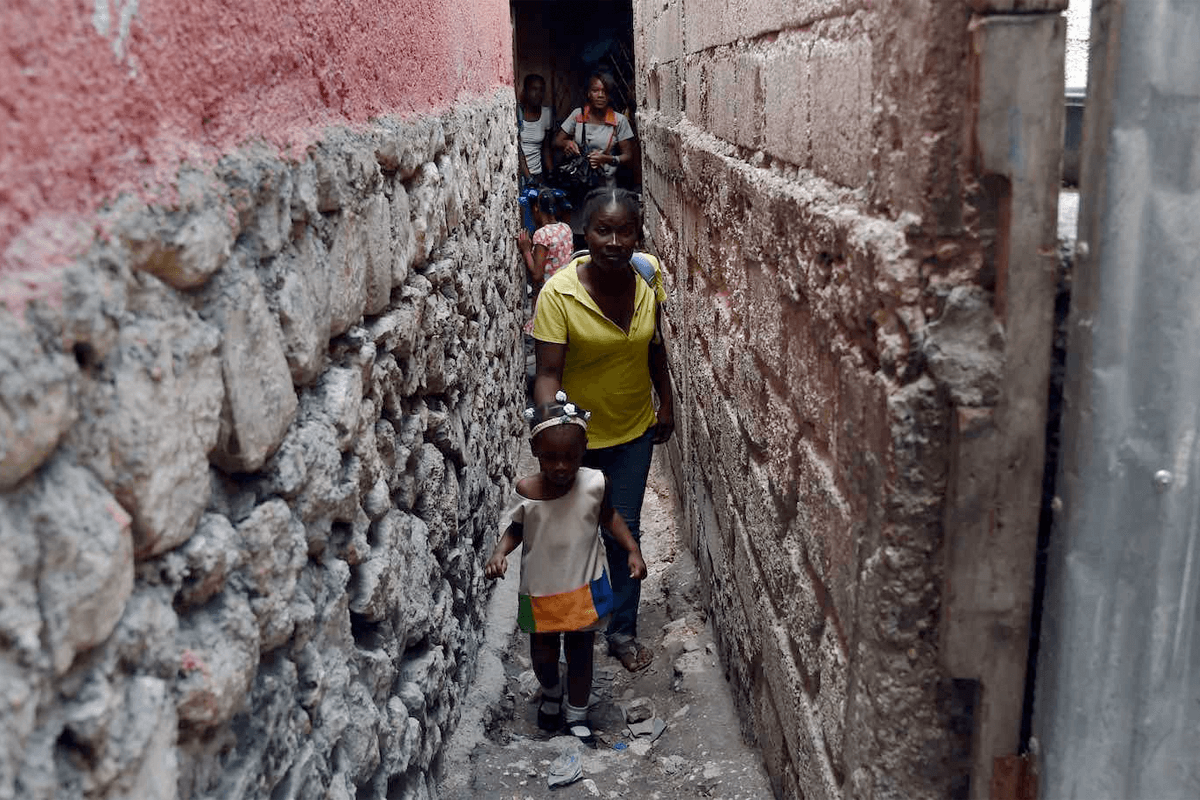
A woman and her daughter walk in a street in the commune
of Petion Ville, Port-au-Prince, 8 March 2016
Legalisation may occur in June 2024, but advocates say the news penal code could undermine any actual progress if enacted unconstitutionally.
Haiti is one of the six countries in the Latin America and Caribbean region that have a total abortion ban. Illegal and unsafe abortions are very common in the country, with an estimated 36% of unintended pregnancies between 2015 and 2019 resulting in abortions, according to an ongoing global Guttmacher Institute study. A January 2023 Human Rights Watch report suggests that the complete ban could finally be eradicated with a revised penal code scheduled to take effect in June 2024. If implemented, the new provisions would dramatically change the legal framework regarding abortion and significantly improve the country’s current protections for pregnant people. However, abortion rights advocates have raised concerns about the conditions under which people will be able to access legal abortions, as well as the ability of the reforms to stay in effect over the long term.
“Under the existing penal code, which dates back to 1835, both the provider and the person receiving the abortion can face charges if they are reported to law enforcement. Art. 262 explicitly states that anyone who induces abortion through methods like “food, drink, medicine, violence, or by any other means” will be subject to imprisonment. “Physicians, surgeons, and other health officers, as well as pharmacists who have indicated or administered these means, will be condemned to the penalty of forced labour…”
“Haiti has the highest rate of maternal mortality in the Western Hemisphere, with an estimated 480 deaths per 100,000 live births. “We estimate that as high as 20% of this rate is due to high-risk abortion,” said Florence Jean Louis Vorbe, the executive director of PROFAMIL.”
“Founded in 1984 and dedicated to sexual and reproductive health in the country, PROFAMIL initially solely focused on methods of contraception, but it now operates mobile clinics, providing post-abortion care all over the country.” “We do a lot of post-abortion services,” Vorbe said. “A lot of women come to us with an abortion that is not finished for us to complete. We have the right to complete it, but not to initiate it.”
MADRE, an international human rights organization advocating for revisions to Haiti’s anti-abortion law since 2010, began organizing workshops and building momentum for the passage of a draft penal code in 2013. These workshops were conducted in partnership with the Haitian Ministry of Justice and Public Security, the Haitian Ministry on the Condition of Women’s Rights and Affairs, and several local and international women’s organizations to address sexual and gender-based violence in Haiti.
In June 2020, the late President Jovenel Moise promulgated by decree reforms to the Haitian penal code, meaning that it was not voted on by any elected officials. The revised code was first scheduled to take effect in June 2022, but it was delayed until next year by Moise’s assassination in 2021 and a push to have the new code approved by Parliament.
The text of the law in the revised penal code will legalise abortion in all circumstances until the 12th week of pregnancy, and at any time in cases of rape or incest or when the mental or physical health of the pregnant person is in danger. It also lists sexual harassment and gender-based violence as punishable offences. But women’s rights groups are calling for the law to be passed by the parliament, not by decree, as that would be unconstitutional.
Social inequalities play a major role in who is able to access abortions in the country. The situation tends to be less grim for wealthy families. “A working woman or a girl whose parents have money can easily find a trained doctor willing to perform their abortion safely,” said Ducena. “Whereas in poor neighborhoods, when a child or woman has an unwanted pregnancy, they are either forced to keep the baby or risk their life in high-risk abortions.”
Women’s rights group are calling for abortion services to be free and well regulated. But the wider context of the women’s rights violations in the country. Considering the current debate surrounding the revised code, local advocates do not believe these provisions will take effect come June 2024. “We don’t have a parliament. We don’t have a president. We don’t have local power. We don’t have anything,” Solages said. “So we don’t know how the situation will [evolve] in the country.” In the meantime, advocates say it is essential for the government to invest in education campaigns to ensure that women and girls can make informed choices about their reproductive health. “For things like emergency contraception, I don’t think that 5 percent of the women here in Haiti know about it,” said Vorbe.
For its part, Nègès Mawon is educating women and girls in impoverished neighborhoods by producing a play called Danta. The play portrays a woman grieving the death of her daughter from an unsafe abortion. After the play, nurses and professionals answer viewers’ questions, providing valuable information. Advocates are seeking to empower women with these discussions, which they see as helping them beyond what any revised penal code could do on its own.
SOURCE: The Nation, by Alma Beauvais, 8 August 2023 + PHOTO by Hector Retamal/AFP via Getty Images, 8 March 2016



